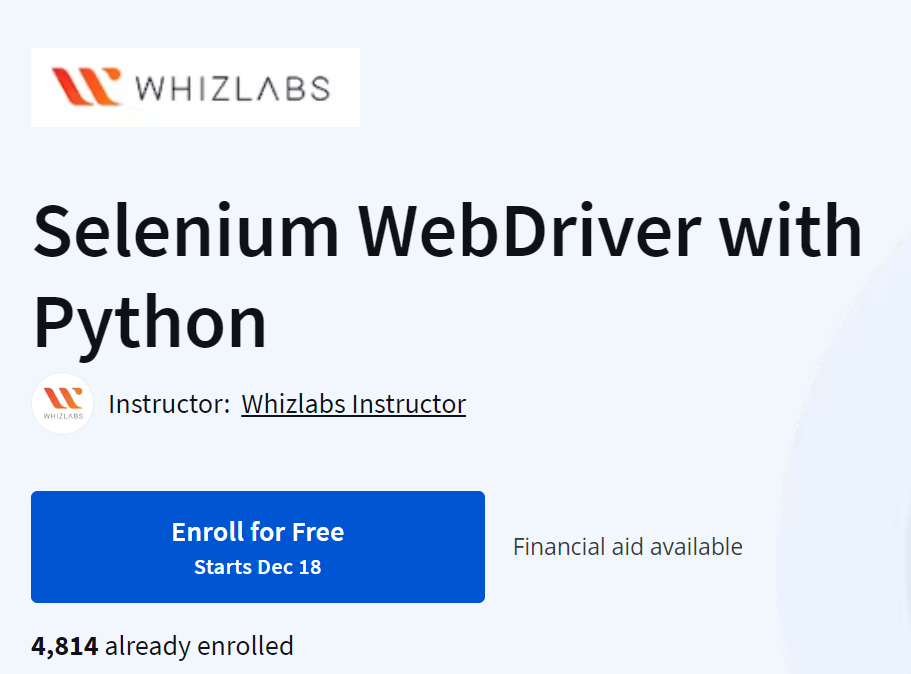
In today’s tech landscape, generative AI (GenAI) isn’t just a research topic — it’s becoming a core part of modern applications. From smart assistants and automated content generation to AI-powered personalization, developers are increasingly expected to integrate AI seamlessly into real systems.
The Gen AI for Developers: Web Development with Python & Copilot project on Coursera gives you a hands-on, practical experience building an AI-enhanced web application using Python and AI tools like Copilot. Instead of abstract theory, this project walks you through the full cycle of designing, implementing, and deploying a GenAI feature set — a valuable addition to any developer’s portfolio.
Why This Project Matters
Many developers know Python and web frameworks, but integrating AI intelligently often seems daunting due to:
-
Unclear workflows for connecting AI to applications
-
Ambiguity about how to structure AI features
-
Concerns about performance, accuracy, and user experience
-
Lack of practical examples that go beyond theory
This project solves that by showing you how to build a working AI-powered web app step by step, combining backend Python logic with AI components, user interaction, and modern tooling (like GitHub Copilot for code assistance).
What You’ll Learn
The project focuses on applying generative AI in a realistic development scenario. Key learning outcomes include:
1. Designing an AI-Powered Web App
Before you code, you’ll think like an engineer:
-
Clarify the app’s goals and user experience
-
Identify where AI makes sense in the workflow
-
Define how AI inputs and outputs will interact with end users
This step helps you frame AI not as an isolated model, but as part of a larger application.
2. Python Web Development Basics
The project uses Python — a widely used language for both web and AI programming.
You’ll work with:
-
A Python web framework (Flask, FastAPI, or similar)
-
Routing and views to handle user requests
-
Templates or frontend components for user interaction
This ensures your AI capabilities are embedded in a working web application.
3. Integrating Generative AI Features
This is the heart of the project:
-
Calling GenAI APIs (e.g., large language models) from Python
-
Handling user input securely and efficiently
-
Generating AI responses (text, classification, autocomplete, etc.)
-
Streaming AI results to the frontend
By the end, your app will be more than a static site — it will think and respond.
4. Using GitHub Copilot as a Coding Partner
AI isn’t just in the deployed app — it’s part of your coding workflow:
-
Leveraging GitHub Copilot to autocomplete code
-
Getting suggestions tailored to your logic and patterns
-
Saving development time on boilerplate and repetitive tasks
-
Focusing your energy on architecture and problem solving
This demonstrates how GenAI can assist developers directly — a practical productivity boost.
5. Deploying a Full Stack Solution
A working AI-enhanced app isn’t useful if it only runs locally. The project guides you through:
-
Preparing your app for deployment (server configuration, APIs)
-
Handling environment variables and secret keys safely
-
Deploying to a cloud service or hosting platform
-
Verifying that AI features work in production
This ensures your final project is deployment-ready, not just demo-ready.
Who This Project Is For
This project is ideal if you are:
-
Web developers wanting to add AI features
-
Python developers expanding into AI-augmented applications
-
Full-stack engineers building modern interactive systems
-
Learners preparing a portfolio-ready project
-
Anyone curious about practical GenAI integration
No prior deep learning or AI research experience is required — the focus is on applied development.
What Makes This Project Valuable
Practical & Applied
You’ll build something real you can show to employers or stakeholders — not just run isolated code snippets.
Modern Tooling
The project uses tools developers actually use today — Python, web frameworks, and AI coding assistants like Copilot.
End-to-End Experience
From design to deployment, you practice the full cycle of building a product with AI in the stack.
Portfolio-Ready
Completing this project gives you a showcase piece that demonstrates both AI and web dev skills — a powerful combination for job seekers.
How This Helps Your Career
By completing this project, you’ll be able to:
✔ Build and integrate generative AI features into real apps
✔ Structure Python web applications for production
✔ Use GitHub Copilot effectively as a developer assistant
✔ Deploy Python AI applications to live environments
✔ Showcase real skills with a working project
These capabilities are valuable in roles such as:
-
AI-Enhanced Software Engineer
-
Full-Stack Developer
-
Python Developer
-
Machine Learning Engineer (applied)
-
Web Developer with AI Integration Skills
Modern development teams increasingly value engineers who can combine domain skills — such as web and AI — to deliver impactful user experiences.
Join Now: Gen AI for developers: Web development with Python & Copilot
Conclusion
The Gen AI for Developers: Web Development with Python & Copilot project on Coursera is a concise yet powerful way to learn how AI fits into real applications, not just research environments. By walking through a complete build, you gain both the conceptual understanding and the hands-on experience needed to:
-
Identify where AI adds value
-
Connect Python backends with generative models
-
Build user interactions around AI outputs
-
Use AI to assist your development workflow as well
Whether you’re adding AI features to your existing apps, preparing a portfolio, or transitioning into AI-augmented development work, this project gives you the confidence and skills to build intelligent web applications in 2026 and beyond.













.PNG)




.png)






.png)



.jpg)









.PNG)









